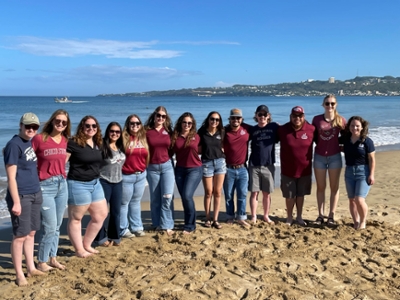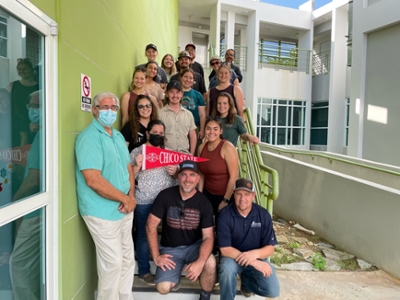Agricultural Exploration Trip Puerto Rico
During winter break, ten Chico State students embarked on a short-term high-impact immersion to Puerto Rico. During their time there, students fully immersed themselves in Puerto Rican agriculture, culture, religion, food, and way of life.
The group of students were led by Dr. Thommas Henderson, an Agricultural Education Professor, and student lead, Ryann Vierra, a senior double majoring in Agricultural Business and Agricultural Education. The two developed a Student Learning Fee (SLF) Grant which covered the cost of ecological and agricultural tours, food, housing, and transportation on the island. The only costs students had to cover consisted of airfare and souvenirs. Along with developing a grant, the two leads spent months planning the trip, making sure each student's interests were met with each tour being thoughtfully planned.
After obtaining grant funding, Vierra and Henderson held an interest meeting for any student from the college. Only students who attended an interest meeting received the link to apply. The trip was designed for ten participants. With over 60 students applying for the trip, their applications were paper screened and then underwent an interview process with a panel made up of one staff member, a faculty member, and the student lead. The final ten were then selected with three alternates.

Prior to departure, participants attended monthly pre-departure preparation meetings co-developed by the faculty and student leads. The meeting topics ranged from developing three personal learning goals to be met on the trip to learning about Puerto Rican history, traditions, culture, cuisine, and agriculture. Each student created two to three learning goals that related to their interests, careers, hobbies, etc.
While in Puerto Rico, participants journaled each night, reflecting on each agricultural stop and experience, connecting their observations and learning to their experiences and how this helped to fulfill their personal learning objectives. Agricultural production tours included; pineapple, coffee, plantains, flower, avocado, dairy, and beef. Participants also had the chance to be guided through El Yunque National Rainforest learning about the interface between historic irrigation projects, the agriculture industry, and endemic plant and animal species.
Participants visited and worked at an FFA chapter from Crome High School where the service learning project took place. The service learning project consisted of taking down a shade house that was decimated by hurricane Fiona, repainting the front side of the agricultural building, constructing a wheelbarrow, and clearing their garden.
Trip attendee Mia Arisman stated “Experiencing service learning in Puerto Rico was transformative. Seeing how vital the agriculture industry is, and how connected the community and culture are was perspective shifting.”
Participants were also able to visit with a researcher at the USDA Farm Service Agency and were able to walk around Puerto Rico's Land Grant University touring their greenhouses, sheep unit, and meats lab.

An employee of the Chico State’s Meats Lab and next student lead, Alexandria Ramirez noted “It was interesting to learn about the meat science facilities on campus at the University of Mayagüez. One of the biggest similarities I noticed was how their Meats Lab processing room was set up, similar to the one we have at Chico State. For instance, both are structured as a classroom-style, meat fabrication lab. Both are centered around being a learning facility for the students to gain hands-on experiences in the meat science and processing industry. One difference that was mentioned by the professor was that they are not USDA inspected, which means they cannot sell their products to the public. I would say one of the best things about working at the Chico State Meats Lab is getting to sell our products to the public, and building connections with our customers within the community.”
Lastly, participants had the opportunity to meet with a marine biologist and began to understand the grassroots efforts being employed to save the marine ecosystem through a guided kayaking trip through a native mangrove forest and witnessing a protected bioluminescent bay. Vierra claims, “Being able to see the trip come together and watch my peers' faces light up at each stop that Dr. Henderson and I planned for them was truly rewarding. Being in contact with various members of the agricultural industry in Puerto Rico for months, and finally getting to meet them in person was such a surreal experience. Planning this incredible trip as the student lead is something that I will cherish throughout my life. I feel that this experience has connected me to the agricultural industry even more and will help me in all facets of life.”
During the trip, participants identified similarities and differences between agricultural practices in Puerto Rico and California, compared and contrasted cultural norms through understanding and experiencing food, religion, ethnic backgrounds, and historical roots of the island territory, and evaluated efforts of sustainable practices on the island.
Reflecting on the trip, Henderson stated “Being able to witness students going through a raw transformational shift in worldview is striking. Their awareness of social, religious, political, and agricultural similarities and differences across two very different geographic regions truly allows them to process the enormity of a Puerto Rican learning trip. Students are able to see that there are other people on this Earth that are just as passionate about agriculture as they are and oftentimes solve problems or accomplish tasks with fewer resources. I am also impressed with how close our group becomes during the trip. By the end of our experience, we all feel like family. Professionally, I find this trip to ground me in my approach to teaching and interacting with my students. It’s so refreshing to be inspired by people who share a common interest but who you’ve just met. I also find the Puerto Rican people to be genuine and beyond generous with their time and resources. I try to emulate these characteristics as much as I can.”
Upon arrival back home, participants created a digital poster that portrayed their met learning goals. The participants also collaborated on a PowerPoint to present to students, faculty, and community members to highlight the trip and review their learning and growth. Finally, participants completed a survey with questions pertaining to their experience on the trip. The data was then collected to be used for future trips.
